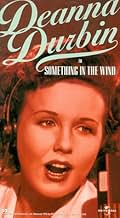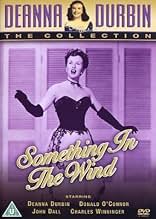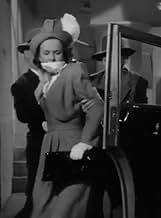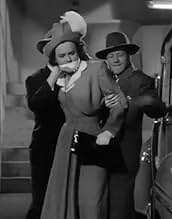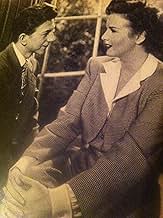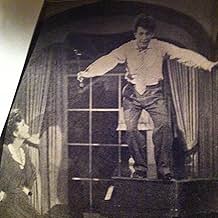VALUTAZIONE IMDb
6,5/10
558
LA TUA VALUTAZIONE
Aggiungi una trama nella tua linguaA grandson of a recently deceased millionaire mistakes a beautiful female disc jockey for her aunt, who once dated the grandfather.A grandson of a recently deceased millionaire mistakes a beautiful female disc jockey for her aunt, who once dated the grandfather.A grandson of a recently deceased millionaire mistakes a beautiful female disc jockey for her aunt, who once dated the grandfather.
- Regia
- Sceneggiatura
- Star
The Williams Brothers
- Singing Quartet
- (as The Four Williams Brothers)
Jacqueline deWit
- Fashion Show Saleslady
- (as Jacqueline de Wit)
Patricia Alphin
- Fashion Show Model
- (non citato nei titoli originali)
Polly Bailey
- Old Woman
- (non citato nei titoli originali)
William Bailey
- Mr. Belton's Assistant
- (non citato nei titoli originali)
Audrey Betz
- Women's Quartette Member
- (non citato nei titoli originali)
Stanley Blystone
- TV Station Guard
- (non citato nei titoli originali)
Betty Blythe
- Society Matron
- (non citato nei titoli originali)
June Bright
- Fashion Show Model
- (non citato nei titoli originali)
Ralph Brooks
- Radio Station Prompter
- (non citato nei titoli originali)
Recensioni in evidenza
SOMETHING IN THE WIND (Universal-International, 1947), directed by Irving Pichel, is not a disaster hurricane or tornado movie, but a light-hearted musical-comedy starring the once-popular Deanna Durbin in one of her final film roles before closing her chapter in movie making by 1948. Considering a handful of "Wind" movie titles, consisting of THE WIND (1928), WOMEN IN THE WIND (1939), REAP THE WILD WIND (1942), VOICE IN THE WIND (1944), and the most famous wind of all, GONE WITH THE WIND (1939), SOMETHING IN THE WIND is simply a song title tagged to an ordinary story quite common during the screwball genre of the 1930s. Following weak comedy attempts of BECAUSE OF HIM (1946) and I'LL BE YOURS (1947), Durbin's latest installment is actually one of her better efforts, especially with the assistance Donald O'Connor.
Abandoning her shoulder-length hairstyle for a more mature 1940s style appearance, Deanna Durbin plays Mary Collins, a singing disc-jockey for WFOB Radio Station. After finishing her daily program, Mary is approached by the angry and upset Donald Read (John Dall), a rich, stuck-up snob identifying himself as grandson to the late Henry Read. Unaware of his purpose, she finds he wants her to sign a cash settlement to cease any further financial means she's been receiving for many years. Accused of being this old man's mistress, Mary, not liking this young man's tactics, storms out of the station. Once home where she lives with her Aunt Mary (Jean Adair), Mary soon learns it's her aunt, who, many years ago, had worked as governess for the Reads where she met and fell in love with Henry. Because the Read family disapproved of their relationship due to social standings, the engagement was broken, with Henry marrying another. Because of his engagement to socialite, Clarissa Prentice (Helena Carter), and hoping to avoid any scandal connected with the family name, Donald gets Charlie (Donald O'Connor), his third cousin, to go to the radio station and abduct Mary. Once inside the Read estate, Mary, knowing the situation to be mistaken identity, is unable to convince other family members, consisting of Grandma Read (Margaret Wycherly) and Uncle Chester (Charles Winninger) she's not the Mary Collins in question, decides to go on with her masquerade and accept the payoff settlement of a million dollars to support her and Henry's "child." As Mary and Donald plot against each other, one of the family members discovers Mary's deception and plots against her.
With Music and Lyrics by Johnny Green and Leo Robin, the motion picture soundtrack is as follows: "The Turntable Song," "Happy-Go-Lucky and Free" (both sung by Deanna Durbin); "I Love a Mystery" (sung and performed by Donald O'Connor); "Don't You, Daddy?" (sung by Durbin during fashion show); "The Turntable Song" (sung by The Four Williams Brothers and Donald O'Connor); "Something in the Wind," "It's Only Love" (both sung by Durbin); "Miserere" from Guiseppe Verdi's IL TROVADORE (sung and performed by Durbin and Jan Peerce, Star of the Metropolitan Opera Company); "Happy-Go-Lucky and Free" and "Something in the Wind" (reprises). Though the songs are forgettable, they're agreeably pleasant. Aside from Durbin's singing, Donald O'Connor highlights with his "I Love a Mystery" number, a somewhat forerunner to his antics to "Make 'Em Laugh" from "Singin' in the Rain" (MGM, 1952), which displays his ability in bot showmanship and comedy. Opera singer Jan Peerce, in a rare screen appearance, cast as a policeman, provides some fine moments singing opposite Durbin in jail. Other cast members include: Jacqueline De Wit (The Saleslady); William Ching (Master of Ceremonies); Chester Clute, Hal K. Dawson, Frank Wilcox, among others.
A couple interesting aspects about SOMETHING IN THE WIND is a look back at early television production provided towards the film's end, and the casting of dramatic actor, John Dall. Dall, on loan from Warner Brothers, best known for his rare screen work of THE CORN IS GREEN (1945), ROPE (1948) and GUN CRAZY (United Artists, 1949), seems uncomfortable in his role, especially when comedy is concerned. A loan-out from MGM's Peter Lawford might have been sufficient, but Dall does his best to make his character believable.
Scarcely shown on television, especially public television where it was commonly shown in the 1980s, SOMETHING IN THE WIND is pleasant, breezy89 minute entertainment, even without the wind. Distributed to home video in 1998, it's currently available on DVD with Durbin's feature film debut, THREE SMART GIRLS (1936), also featuring Charles Winninger, on its flip side. (***)
Abandoning her shoulder-length hairstyle for a more mature 1940s style appearance, Deanna Durbin plays Mary Collins, a singing disc-jockey for WFOB Radio Station. After finishing her daily program, Mary is approached by the angry and upset Donald Read (John Dall), a rich, stuck-up snob identifying himself as grandson to the late Henry Read. Unaware of his purpose, she finds he wants her to sign a cash settlement to cease any further financial means she's been receiving for many years. Accused of being this old man's mistress, Mary, not liking this young man's tactics, storms out of the station. Once home where she lives with her Aunt Mary (Jean Adair), Mary soon learns it's her aunt, who, many years ago, had worked as governess for the Reads where she met and fell in love with Henry. Because the Read family disapproved of their relationship due to social standings, the engagement was broken, with Henry marrying another. Because of his engagement to socialite, Clarissa Prentice (Helena Carter), and hoping to avoid any scandal connected with the family name, Donald gets Charlie (Donald O'Connor), his third cousin, to go to the radio station and abduct Mary. Once inside the Read estate, Mary, knowing the situation to be mistaken identity, is unable to convince other family members, consisting of Grandma Read (Margaret Wycherly) and Uncle Chester (Charles Winninger) she's not the Mary Collins in question, decides to go on with her masquerade and accept the payoff settlement of a million dollars to support her and Henry's "child." As Mary and Donald plot against each other, one of the family members discovers Mary's deception and plots against her.
With Music and Lyrics by Johnny Green and Leo Robin, the motion picture soundtrack is as follows: "The Turntable Song," "Happy-Go-Lucky and Free" (both sung by Deanna Durbin); "I Love a Mystery" (sung and performed by Donald O'Connor); "Don't You, Daddy?" (sung by Durbin during fashion show); "The Turntable Song" (sung by The Four Williams Brothers and Donald O'Connor); "Something in the Wind," "It's Only Love" (both sung by Durbin); "Miserere" from Guiseppe Verdi's IL TROVADORE (sung and performed by Durbin and Jan Peerce, Star of the Metropolitan Opera Company); "Happy-Go-Lucky and Free" and "Something in the Wind" (reprises). Though the songs are forgettable, they're agreeably pleasant. Aside from Durbin's singing, Donald O'Connor highlights with his "I Love a Mystery" number, a somewhat forerunner to his antics to "Make 'Em Laugh" from "Singin' in the Rain" (MGM, 1952), which displays his ability in bot showmanship and comedy. Opera singer Jan Peerce, in a rare screen appearance, cast as a policeman, provides some fine moments singing opposite Durbin in jail. Other cast members include: Jacqueline De Wit (The Saleslady); William Ching (Master of Ceremonies); Chester Clute, Hal K. Dawson, Frank Wilcox, among others.
A couple interesting aspects about SOMETHING IN THE WIND is a look back at early television production provided towards the film's end, and the casting of dramatic actor, John Dall. Dall, on loan from Warner Brothers, best known for his rare screen work of THE CORN IS GREEN (1945), ROPE (1948) and GUN CRAZY (United Artists, 1949), seems uncomfortable in his role, especially when comedy is concerned. A loan-out from MGM's Peter Lawford might have been sufficient, but Dall does his best to make his character believable.
Scarcely shown on television, especially public television where it was commonly shown in the 1980s, SOMETHING IN THE WIND is pleasant, breezy89 minute entertainment, even without the wind. Distributed to home video in 1998, it's currently available on DVD with Durbin's feature film debut, THREE SMART GIRLS (1936), also featuring Charles Winninger, on its flip side. (***)
Deanna Durbin was at the peak of her vocal abilities on screen by the time she made SOMETHING IN THE WIND and fortunately she has some pleasant and frequent musical interludes sprinkled throughout what is essentially a feeble plot.
She's once again up to her neck in a plot relying heavily on mistaken identity and pretending to be someone she's not. Her leading men are Donald O'Connor and John Dall, the latter being her love interest in a somewhat wooden performance. O'Connor tends to over exert himself in some rambunctious musical numbers while Deanna not only sings some lively numbers but also joins Jan Peerce, tenor of the Metropolitan Opera, for an operatic aria.
Obviously the film was designed to give Deanna a new and more glamorous look and wardrobe and some popular melodies to sing rather than the usual operatic or semi-classical numbers. Unfortunately, the plot is no more adult than her "little Miss Fix-it" fluff earlier in her career. But she looks wonderful and is in extremely good voice for all of her vocals. A pleasant and diverting experience for true Deanna Durbin fans.
She's once again up to her neck in a plot relying heavily on mistaken identity and pretending to be someone she's not. Her leading men are Donald O'Connor and John Dall, the latter being her love interest in a somewhat wooden performance. O'Connor tends to over exert himself in some rambunctious musical numbers while Deanna not only sings some lively numbers but also joins Jan Peerce, tenor of the Metropolitan Opera, for an operatic aria.
Obviously the film was designed to give Deanna a new and more glamorous look and wardrobe and some popular melodies to sing rather than the usual operatic or semi-classical numbers. Unfortunately, the plot is no more adult than her "little Miss Fix-it" fluff earlier in her career. But she looks wonderful and is in extremely good voice for all of her vocals. A pleasant and diverting experience for true Deanna Durbin fans.
I recently purchased this DVD as part of a six movie pack. I wished to review "Something In The Wind" because I had focused on Donald O'Connor too much. I was pleased to note that Deanna Durbin was an accomplished light comedy actress in addition to her vocal talents. The ease with which she performed her first song in this movie as a disc jockey is an excellent example of her innate acting ability.
The role played by John Dall seemed too far removed from his role in "The Corn Is Green". There seemed to be little chemistry between Durbin and Dall.
Donald O'Connor was polished as usual but then he had been in movies for over a decade by this time having debuted with Bing Crosby and Fred MacMurray in "Sing You Sinners". It was interesting to realize that the zany short routine he did for Deanna was the groundwork for his 'Make 'Em Laugh' routine in "Singing In The Rain".
Although the impact of "100 Men And A Girl" was never realized again, Deanna Durbin left an enjoyable body of work in her career in Hollywood. There were five or so as a young teen-ager beginning with "Three Smart Girls", "100 Men And A Girl", "Mad About You", "That Certain Age" and Three Smart Girls Grow Up".
With the advent of "First Love" (her'first screen kiss')and pairing with Bob Stack, she began to leave the adolescent stage. Her subsequent movies showed that she had acting ability in addition to her juvenile charm and appealing voice. She did not experience the awkward stage of Shirley Temple and graduated smoothly into adult roles. She may not have been another Irene Dunne nor Rosalind Russell but her comedy was enjoyable and her vocalization always pleasant albeit somewhat schmaltzy to some.
The Williams Bros received billing in this movie but it would be difficult to pick out which one was Andy.
For those not fortunate enough to have grown up in the Deanna Durbin 'saves Univeral Studio' era, this movie is one fine example of how she did it. Light but very entertaining.
The role played by John Dall seemed too far removed from his role in "The Corn Is Green". There seemed to be little chemistry between Durbin and Dall.
Donald O'Connor was polished as usual but then he had been in movies for over a decade by this time having debuted with Bing Crosby and Fred MacMurray in "Sing You Sinners". It was interesting to realize that the zany short routine he did for Deanna was the groundwork for his 'Make 'Em Laugh' routine in "Singing In The Rain".
Although the impact of "100 Men And A Girl" was never realized again, Deanna Durbin left an enjoyable body of work in her career in Hollywood. There were five or so as a young teen-ager beginning with "Three Smart Girls", "100 Men And A Girl", "Mad About You", "That Certain Age" and Three Smart Girls Grow Up".
With the advent of "First Love" (her'first screen kiss')and pairing with Bob Stack, she began to leave the adolescent stage. Her subsequent movies showed that she had acting ability in addition to her juvenile charm and appealing voice. She did not experience the awkward stage of Shirley Temple and graduated smoothly into adult roles. She may not have been another Irene Dunne nor Rosalind Russell but her comedy was enjoyable and her vocalization always pleasant albeit somewhat schmaltzy to some.
The Williams Bros received billing in this movie but it would be difficult to pick out which one was Andy.
For those not fortunate enough to have grown up in the Deanna Durbin 'saves Univeral Studio' era, this movie is one fine example of how she did it. Light but very entertaining.
Few I suspect at Universal Studios thought that Something In The Wind would be one of Deanna Durbin's last films. If they thought that they might have taken more care with her material.
Teaming Deanna with Donald O'Connor another one of their juvenile mainstays was probably inevitable. Both O'Connor and Deanna are served well by the songs obviously written both in mind. Deanna's Turntable Song sold a few records back in the day and O'Connor's I Love A Mystery song and routine are well suited to his talents. But the highlight is an aria from Il Trovatore that Durbin sings with Jan Peerce of the Metropolitan Opera playing an opera singing cop.
The plot is truly a silly one. Older brother John Dall comes marching into Deanna's radio studio all full of himself demanding that she cease and desist demands for payments that his grandfather has been paying regularly to her. In fact grandfather was making payments to Durbin's aunt Jean Adair and a cursory examination of the records would show that the payments started before Durbin was born. But no one said Dall was too bright.
In any event this stupid error becomes the basis for the rest of the film causing complications for Dall, Durbin and O'Connor playing Dall's younger brother. Dall also has a fiancé played by Helena Carter who takes a dim view of it all as does his grandmother Margaret Wycherly.
Others besides Durbin and O'Connor fans might like Something In The Wind. But both have done better work than this.
Teaming Deanna with Donald O'Connor another one of their juvenile mainstays was probably inevitable. Both O'Connor and Deanna are served well by the songs obviously written both in mind. Deanna's Turntable Song sold a few records back in the day and O'Connor's I Love A Mystery song and routine are well suited to his talents. But the highlight is an aria from Il Trovatore that Durbin sings with Jan Peerce of the Metropolitan Opera playing an opera singing cop.
The plot is truly a silly one. Older brother John Dall comes marching into Deanna's radio studio all full of himself demanding that she cease and desist demands for payments that his grandfather has been paying regularly to her. In fact grandfather was making payments to Durbin's aunt Jean Adair and a cursory examination of the records would show that the payments started before Durbin was born. But no one said Dall was too bright.
In any event this stupid error becomes the basis for the rest of the film causing complications for Dall, Durbin and O'Connor playing Dall's younger brother. Dall also has a fiancé played by Helena Carter who takes a dim view of it all as does his grandmother Margaret Wycherly.
Others besides Durbin and O'Connor fans might like Something In The Wind. But both have done better work than this.
Deanna Durbin was a HUGE star in the 1930s-40s--and for a while she was the highest paid actress in Hollywood. However, today most folks probably haven't heard of her. This is because Miss Durbin walked away from her film career when she was in her 20s and going strong-- apparently because she got bored with films and the very formulaic films they put her in over the years. This sort of problem is pretty obvious in "Something in the Wind"--a film where Durbin did quite well but the writing of the film was clearly well below her. Little did Universal Studios realize that in giving her crap scripts like this, they were also pushing their big money-maker out the studio door!
The film begins with Mary Collins (Durbin) leaving work at the radio station when an obnoxious and ill-informed lawyer accosts her and tries to get her to sign some release. She has no idea WHAT he's talking about and finds his comments insulting. However, when she gets home, she learns from the aunt that the lawyer mistook Mary for the aunt--who is also named Mary! It seems that long ago, Aunt Mary was involved with some rich guy but he dumped her and married another woman to please his snobby family. Apparently out of feelings of guilt, the old man had been sending Aunt Mary checks...and the man's family ASSUMED that the money was hush money!
Here is where it starts to get a tad dumb. Because Mary wouldn't talk with the lawyer, the family has her kidnapped and they once again ask young Mary to take some sort of settlement to shut up and go away forever in order to 'preserve the family name'. Out of anger, she lies- -telling them that she had the old man's baby!! Now, she insists they give her a million bucks! She has no intention to take the money--she just wants to make the jerks sweat.
Contrived? Yup! But it gets much worse--as the handsome son inexplicably and very, very, very quickly falls in love with Mary (Durbin--not the old lady!). In addition, there is tons of music and dancing--so much so that it really looks like padding since the plot is so thin. So why does it still manage to get a 5? Well, Durbin, when not singing, is very funny and proves she was simply too good for this tripe.
The film begins with Mary Collins (Durbin) leaving work at the radio station when an obnoxious and ill-informed lawyer accosts her and tries to get her to sign some release. She has no idea WHAT he's talking about and finds his comments insulting. However, when she gets home, she learns from the aunt that the lawyer mistook Mary for the aunt--who is also named Mary! It seems that long ago, Aunt Mary was involved with some rich guy but he dumped her and married another woman to please his snobby family. Apparently out of feelings of guilt, the old man had been sending Aunt Mary checks...and the man's family ASSUMED that the money was hush money!
Here is where it starts to get a tad dumb. Because Mary wouldn't talk with the lawyer, the family has her kidnapped and they once again ask young Mary to take some sort of settlement to shut up and go away forever in order to 'preserve the family name'. Out of anger, she lies- -telling them that she had the old man's baby!! Now, she insists they give her a million bucks! She has no intention to take the money--she just wants to make the jerks sweat.
Contrived? Yup! But it gets much worse--as the handsome son inexplicably and very, very, very quickly falls in love with Mary (Durbin--not the old lady!). In addition, there is tons of music and dancing--so much so that it really looks like padding since the plot is so thin. So why does it still manage to get a 5? Well, Durbin, when not singing, is very funny and proves she was simply too good for this tripe.
Lo sapevi?
- QuizDonald O'Connor's first movie after returning from service in World War II.
- Citazioni
Orchestra Leader at Fashion Show: And now for our new collection of evening gowns. These gowns are designed to ensure that large amounts of money change hands. The fainthearted are advised not to look.
I più visti
Accedi per valutare e creare un elenco di titoli salvati per ottenere consigli personalizzati
- How long is Something in the Wind?Powered by Alexa
Dettagli
- Data di uscita
- Paese di origine
- Lingua
- Celebre anche come
- Something in the Wind
- Luoghi delle riprese
- Azienda produttrice
- Vedi altri crediti dell’azienda su IMDbPro
- Tempo di esecuzione
- 1h 34min(94 min)
- Colore
- Proporzioni
- 1.37 : 1
Contribuisci a questa pagina
Suggerisci una modifica o aggiungi i contenuti mancanti

